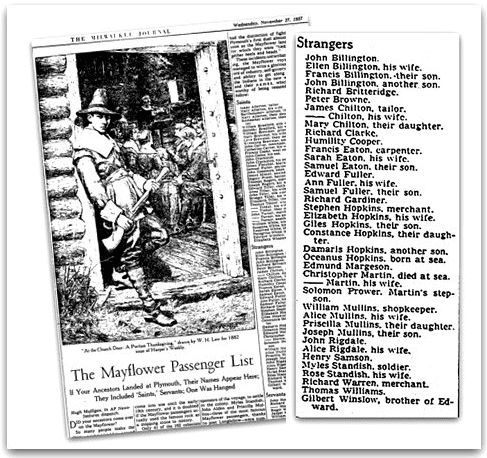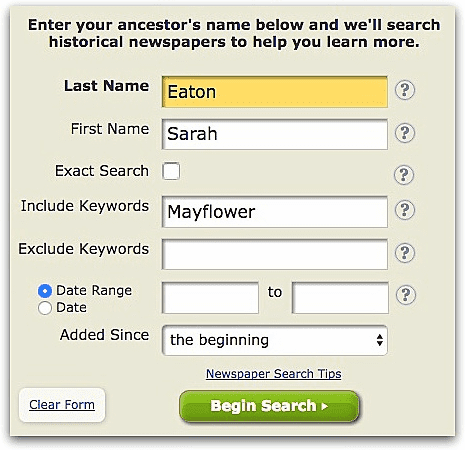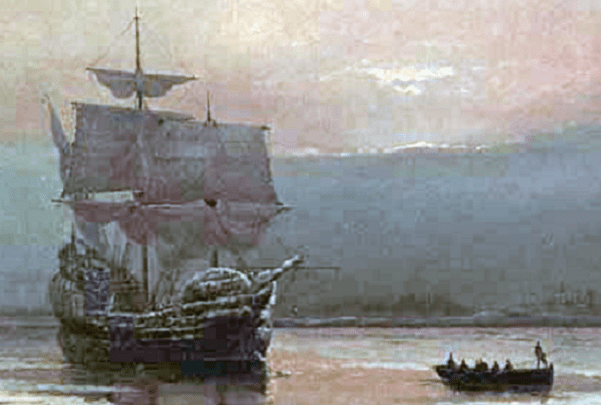As I have mentioned in previous posts, like many of you I am descended from some of the original Mayflower Pilgrims. One of these Mayflower ancestors is Francis Eaton (1596-1633), a carpenter, who came to the New World with his family in 1620.

According to my notes, Francis is my many times great-grandfather. I already know quite a bit about him from history books and my own family history research, but I know much less about his wife who accompanied him aboard the Mayflower. In fact, all I know from my notes and other historical sources is that Francis’s wife’s name was Sarah (c. 1590-1621), and that she and Francis married in England around 1618 and had a son named Samuel before boarding the Mayflower, but very little else has been recorded about her.
To see if I could discover any new details about my Pilgrim ancestors, I decided to research them using GenealogyBank’s Historical Newspaper Archives. A lot has been written about Francis’s life in the colonies, but I was looking specifically for articles that included both Francis and Sarah. I assumed that any records that mentioned Sarah would also mention Francis, so I searched for Sarah’s first and last names and included the keyword “Mayflower” to narrow the search results down to just sources that mentioned the Mayflower Eaton’s.

This search generated an interesting article from the Milwaukee Journal-Sentinel about the original Mayflower Pilgrims.
This newspaper article explains that, although many people believe that the Pilgrims came to America for religious freedom, the reality is that fewer than half of them had religious motivations – the others were hired to settle the colony by the Merchant Adventurers, the company that sponsored the voyage. Those that came for religious reasons were called “saints,” while those who were hired were called “strangers.”
Notice in the article, Francis and Sarah are listed not among the religious pilgrims, but among the strangers who were paid to settle the colony – meaning they didn’t come for religious purposes after all, but were hired to settle here.
According to a notation in Francis’ FamilySearch records, he was the ship’s carpenter on board the Mayflower:
“Francis Eaton was a carpenter by trade and [historian Charles Edward Banks] believes that he was the Mayflower ship’s carpenter, being in the employ of the Merchant Adventurers, financial supporters of the Mayflower venture.”
Next, I tracked down Charles Edward Banks’s book to find the passage the notation above refers to. A quick search on Google Books returned the passage in question.
Governor William Bradford listed Francis and Sarah Eaton, along with their son, toward the end of his Mayflower passenger list.
Notice that following this entry is a list of men traveling alone – and then the entry for John Alden who “was hired for a cooper, at South-Hampton, where the ship victuled.”
Based on these findings, I can assume that Francis and Sarah were, in fact, “strangers” in the colonies rather than religious pilgrims. However, we can also safely assume they had one thing in common with the rest of the passengers aboard the Mayflower: a hope for a fresh start and a new life in America that was better than the one they left behind.
Genealogy Tip: Even if you think you know a lot about your Mayflower Pilgrim ancestors, GenealogyBank’s Historical Newspaper Archives can be a great resource for finding new details that your records may not already have, including information that may dispel preconceived ideas that you had about your early progenitors.
Related Articles:
